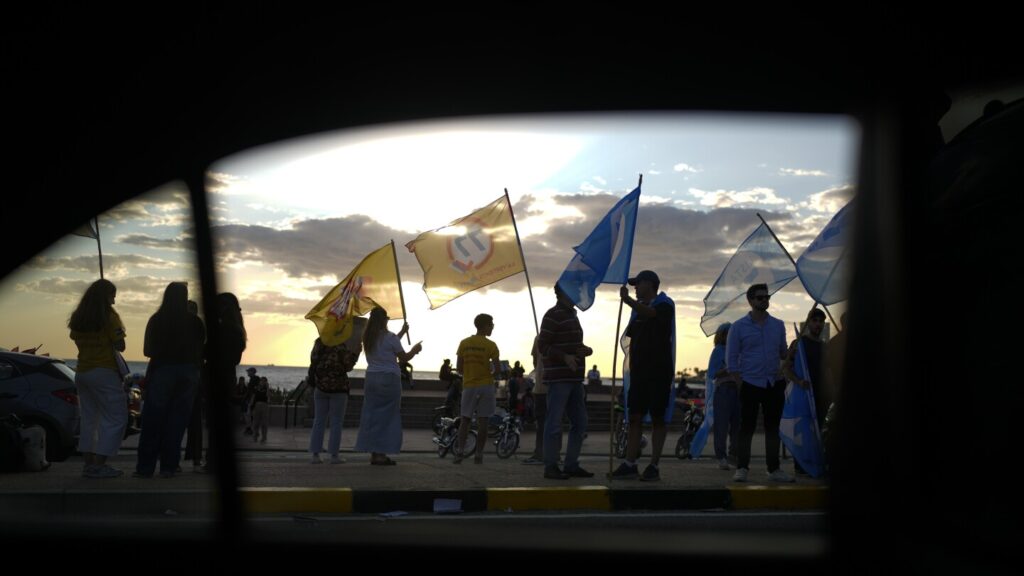MONTEVIDEO, Uruguay (AP) – Voters in the small South American nation of Uruguay went to the polls Sunday to choose a new president in a contest between two moderates who buck the region’s trends of bitter division and erosion of democracy.
The battle between Uruguay’s incumbent conservative coalition and its challengers, a centre-left coalition, began with some 2.7 million voters also voting in a contentious referendum on the overhaul of parliament and the social security system. .
The pension vote, which will widen the budget deficit in one of Latin America’s richest countries, has been voted on more frequently in recent weeks than other key campaign issues such as child poverty, education and security. is attracting media attention.
The candidates are largely in agreement on many issues, and hopes for a presidential vote that will bring about dramatic changes in the country of 3.4 million, long considered a model democracy and a bastion of regional stability. No one does.
“In a sense, Uruguay is boring, but boredom in this sense is a very good thing,” said Juan Cruz Díaz, a political analyst who runs the Buenos Aires consultancy Cefeidas. “We’ve seen a lot of dramatic changes in Argentina, Brazil, Ecuador and Colombia, and suddenly we’re facing a consensus and stable election in Uruguay.”
While voters in neighboring Brazil and Argentina have recently expressed anger over the current situation, voters in Uruguay remain largely satisfied with the government’s pro-business policies and steady economic growth. The current centre-right president, Luis Lacalle Pou, has an approval rating of 50%.
More than 50 countries will go to the polls in 2024
The presidential campaign unfolded without the virulent insults and personal attacks seen in other countries such as the United States, Argentina and Brazil.
Because the constitutional term limit restricts Lacalle Pou from running for a second consecutive term, the ruling party’s candidate is Alvaro Delgado, a member of the House of Representatives and Lacalle Pou’s former chief of staff who started his career as a veterinarian. Mr. (55).
“We cast our votes with joy in a very special election, grateful for our proud democracy and Uruguay’s spirit of respect and tolerance,” Delgado posted on social media platform X after the vote.
His main challenger is the 57-year-old centre-left former mayor and history teacher from the Frente Amplio (or Broad Front) coalition, which ruled from 2005 to 2020 before Lacalle Pou won. Mr. Yamandou Orsi. This alliance oversaw the legalization of same-sex marriage. Uruguay became the first country to legalize recreational cannabis and developed the world’s greenest electricity grid, powered by 98% renewable energy.
The latest opinion polls show Orsi with a solid 44% lead, but he has not won outright, and the country will go to a run-off election on November 24.
Mr. Orsi voted at a school in the cattle and sheep ranch of the Canelones district, about 50 kilometers (31 miles) from the capital Montevideo, where he twice served as mayor. As he emerged from the voting booth, he expressed pride in his country’s enduring faith in democracy, which was restored in 1984 after 12 years of dictatorship.
“Uruguay has enjoyed 40 years of uninterrupted happiness…a happiness where the people can choose their leaders,” Orsi said. “In today’s world, that’s a great privilege.”
Mr. Orsi is the successor of Jose “Pepe” Mujica, the popular eccentric former guerrilla who spearheaded Uruguay’s transformation into the continent’s most socially liberal country during his 2010-2015 presidential term. We have benefited from the support of the President.
Mujica, who is 89 years old and is battling esophageal cancer, voted Sunday in the capital Montevideo. He arrived at the polls in a wheelchair and was immediately swarmed by reporters.
“We need to support democracy not because it’s perfect, but because humanity hasn’t invented anything better yet,” he told reporters after leaving the polling station. spoke.
Like Mujica, who lives in a modest farmhouse on the outskirts of Montevideo, Orsi said he would not live in the presidential palace if elected.
A distant third is Andres Ojeda, 40, a muscular and media-savvy lawyer. He has tried to energize apathetic young voters with flashy campaign videos in which he lifts weights at the gym and describes himself as a typical Capricorn.
He told The Associated Press that his unconventional style is similar to that of other Latin American artists who use social media to gather fans, such as El Salvadoran populist Nayib Boucle and Argentina’s radical liberal Javier Millay. He said he draws inspiration from charismatic “new political leaders.” But he supports the ruling coalition and has promised no fundamental changes.
The campaign has largely focused on the rise in murders and robberies, with the ruling coalition advocating a tough-on-crime approach and the Liberal coalition calling for an expanded role for the state in security matters.
Voters are also concerned about one in five Uruguayan children living in poverty and low high school graduation rates.
However, overlapping political platforms have left many Uruguayan voters apathetic.
“We haven’t reached the level of participation that Uruguay has had historically in a presidential campaign that is far away from the people,” said Julián Kanarek, a Montevideo-based political analyst.
Even more divisive than the presidential election is the constitutional referendum on revising Uruguay’s social security system.
If approved by more than 50% of voters, the $23 billion plan, backed by the country’s powerful labor unions, would lower the retirement age, increase benefits and transfer Uruguayans’ privately managed savings into government-run trusts. It turns out.
Both leading candidates have voiced their opposition to the proposal, which has already rattled global markets. Supporters say it would redistribute Uruguay’s resources more equitably, ignoring the fiscal implications.
A referendum is also being held to allow police to search homes at night.
Uruguayans are not obliged to vote in national referendums, but they are required to vote in parliamentary and presidential elections.
___
Debre reported from Buenos Aires, Argentina.

